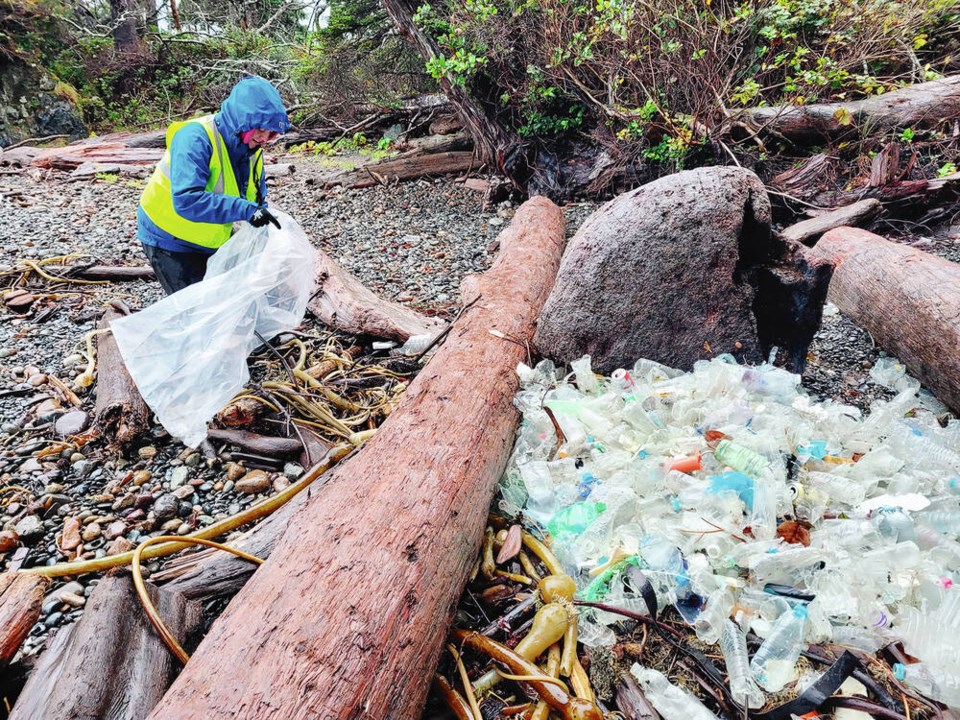London Drugs says it stands to lose hundreds of thousands of dollars in sales and profits because two containers worth of December holiday merchandise are trapped on board the fire-stricken Zim Kingston ship moored off Victoria.
Clint Mahlman, president and chief executive of the B.C.-based retail chain, said Monday that even if the items survived the fire in good condition, “they certainly won’t be here before Christmas.”
The two containers are carrying Christmas notions, tableware and small items with Christmas motifs such as lighting for indoor displays. Mahlman said it’s a small proportion of London Drugs’ seasonal merchandise, since the company prefers to buy products in North America.
Victoria-based Orca Book Publishers said last week it had 15,000 children’s books on the Zim Kingston but does not know their condition and is also not expecting to see them by Christmas. The publisher said it has reordered the five titles involved.
Once the ship moves to a new port, insurance companies will be responsible for offloading the containers, which will then be inspected for damage from smoke or water.
London Drugs learned last week that a “general average” approach has been declared by the shipper, meaning losses would be shared between the shipper and cargo owners.
There are close to 2,000 containers on board the ship, which lost 109 containers into the waters off the west coast of Vancouver Island on Oct. 22 in rough weather. Four containers have been found on the north Island and debris is spread throughout the area.
After the Zim Kingston’s containers went overboard, the ship made its way to Constance Bank off Victoria, where a fire broke out among some remaining containers. The Canadian Coast Guard said a report that one container might have gone overboard during the fire has not been confirmed.
The ship has been given the go-ahead by federal officials to move to either Vancouver or Nanaimo, provided safety protocols, including a Canadian convoy to accompany it, are followed.
Darrell Wilson, spokesman for Greece-based Danaos Shipping, which manages the Zim Kingston, said Monday the company has not yet decided which port to move to.
Wilson said details about cargo and customers are not being revealed due to client confidentiality.
Cleanup efforts continue at north Island beaches where a variety of debris from containers has washed up, from inflatable dinosaur toys to board games, water filters, rubber mats, work boots, armrests for chairs, toy unicorns, water filters and soup packages.
Earlier, 71 refrigerators were taken off beaches. This past weekend saw another 44 fridges moved off the shore, along with scrap metal and 160 garbage bags of packing material, said Kiri Westnedge of the coast guard.
At Raft Cove, Amix, the contractor hired by the ship’s owner, and members of the Quatsino First Nation hiked in to the beach and continued to clean up debris, she said.
Two helicopters made a total of 35 trips to move 123 garbage bags of material and 65 bulk bags of debris, and a shipping container was secured to the beach. The next day, the last material was removed from the container, packed in 44 garbage bags and four bulk bags, and moved to the landing zone, where it will be airlifted out.
Debris at Guise Bay and Palmerston Beach has been collected and moved to a landing site for removal. Crews continue to inspect the areas, as some debris continues to wash in at high tide, said Westnedge, noting new materials have been found at Experiment Bight.
Chloe Dubois, co-founder and president of the non-profit Ocean Legacy in Vancouver, which is developing strategies to remove and recycle ocean plastics, was among 16 representatives from five non-profit environmental organizations joining cleanup teams this past weekend. Participants came from Ocean Legacy, Rugged Coast Research Society, Living Oceans Society, Epic Exeo and Surfrider Pacific Rim.
The non-profits are on standby to return at week’s end if needed, she said. Ashley Tapp from Epic Expo, a Port McNeill group, is playing a key role in helping with the cleanup co-ordination, where to mobilize workers, understanding local terrain and more, Dubois said.
Some containers appear to have split open underwater, because new materials have been coming ashore, she said. Some containers had plywood bases, which would have been easily ripped apart.
Speed is critical when cleaning up plastics. In some areas, the tide has come in and carried debris out to the ocean again, where it can break up and get into the food chain, Dubois said.
There’s a “good effort” on the beaches, but local people say they are in this for the long haul, she said.



